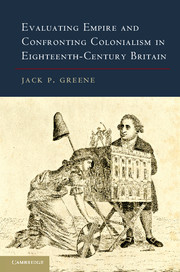Book contents
- Frontmatter
- Contents
- Preface Confronting Empire
- Prologue “Scene of a Foul Transaction”
- 1 “The Principal Cornucopia of Great-Britain's Wealth”
- 2 Outposts of “Loose Vagrant People”
- 3 “A Fabric at Once the Dread and Wonder of the World”
- 4 Arenas of “Asiatic Plunder”
- 5 Sites of Creolean Despotism
- 6 “A Fruitless, Bloody, Wasting War”
- 7 “This Voraginous Gulph of Hibernian Dependence”
- 8 A “Shadow of Our Former Glory”?
- Epilogue “Against Every Principle of Justice, Humanity, and Whatever is Allowed to be Right Among Mankind”
- Index
- References
Prologue - “Scene of a Foul Transaction”
The Languages of Empire and the Carib War in St. Vincent
Published online by Cambridge University Press: 05 June 2013
- Frontmatter
- Contents
- Preface Confronting Empire
- Prologue “Scene of a Foul Transaction”
- 1 “The Principal Cornucopia of Great-Britain's Wealth”
- 2 Outposts of “Loose Vagrant People”
- 3 “A Fabric at Once the Dread and Wonder of the World”
- 4 Arenas of “Asiatic Plunder”
- 5 Sites of Creolean Despotism
- 6 “A Fruitless, Bloody, Wasting War”
- 7 “This Voraginous Gulph of Hibernian Dependence”
- 8 A “Shadow of Our Former Glory”?
- Epilogue “Against Every Principle of Justice, Humanity, and Whatever is Allowed to be Right Among Mankind”
- Index
- References
Summary
In 1772, the British government launched a military campaign against the so-called Black Caribs of the Windward Island colony of St. Vincent. In March, Wills Hill, earl of Hillsborough and secretary of state for the American colonies, ordered the royal navy to send several ships of the line and General Thomas Gage to dispatch two army regiments from Boston to St. Vincent. Under the command of newly promoted Major General William Dalrymple, the regiments arrived in the colony in early August. Throughout the fall, these forces, numbering more than a thousand but beset by disputes over command and extensive sickness among the soldiery, made little headway against the Caribs, who, though numbering only three to four thousand people and fewer than 500 fighting men, used guerrilla tactics to impede the British advance. By the end of the year, as the author of the most recent study of this expedition observes, “a comparatively vast military effort against a handful of Black Caribs had failed to exterminate them or even make them talk of peace.” As reports of this expedition and its problems filtered back to Britain in the late fall of 1772, they elicited a firestorm of criticism both in and out of Parliament. The ensuing debate over the justice of the war in St. Vincent provided a forum for the many discursive languages contemporary Britons used to speak about empire and revealed some of the earliest manifestations of a growing concern about the moral price of overseas colonialism, a price derived by weighing the economic and strategic benefits of empire against its ethical and moral costs.
- Type
- Chapter
- Information
- Publisher: Cambridge University PressPrint publication year: 2013

